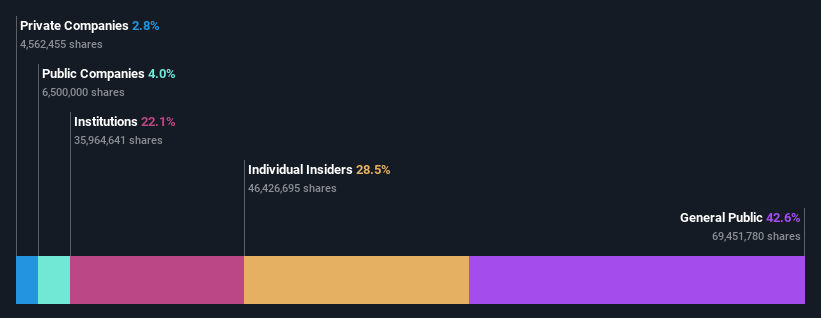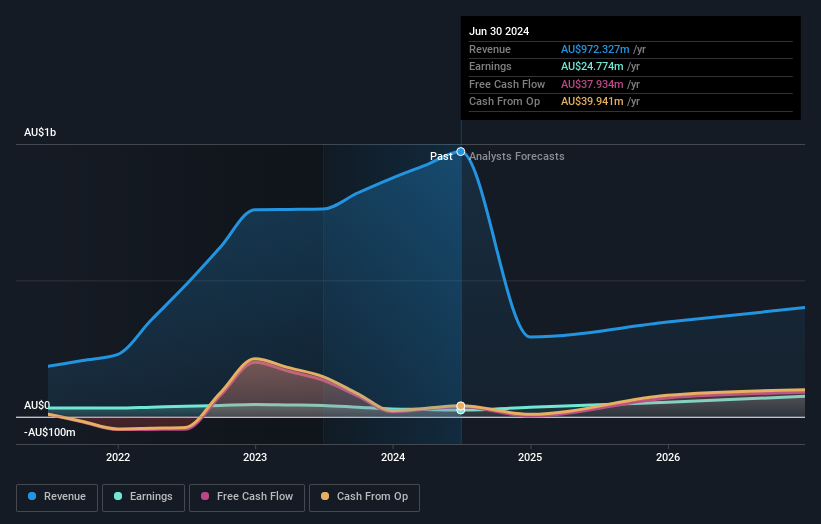- Australia
- /
- Capital Markets
- /
- ASX:MAF
MA Financial Group Limited's (ASX:MAF) market cap up AU$104m last week, benefiting both individual investors who own 43% as well as insiders

Key Insights
- Significant control over MA Financial Group by individual investors implies that the general public has more power to influence management and governance-related decisions
- The top 9 shareholders own 51% of the company
- Insiders have been selling lately
Every investor in MA Financial Group Limited (ASX:MAF) should be aware of the most powerful shareholder groups. With 43% stake, individual investors possess the maximum shares in the company. Put another way, the group faces the maximum upside potential (or downside risk).
While individual investors were the group that benefitted the most from last week’s AU$104m market cap gain, insiders too had a 28% share in those profits.
Let's delve deeper into each type of owner of MA Financial Group, beginning with the chart below.
See our latest analysis for MA Financial Group

What Does The Institutional Ownership Tell Us About MA Financial Group?
Institutional investors commonly compare their own returns to the returns of a commonly followed index. So they generally do consider buying larger companies that are included in the relevant benchmark index.
As you can see, institutional investors have a fair amount of stake in MA Financial Group. This suggests some credibility amongst professional investors. But we can't rely on that fact alone since institutions make bad investments sometimes, just like everyone does. It is not uncommon to see a big share price drop if two large institutional investors try to sell out of a stock at the same time. So it is worth checking the past earnings trajectory of MA Financial Group, (below). Of course, keep in mind that there are other factors to consider, too.

MA Financial Group is not owned by hedge funds. From our data, we infer that the largest shareholder is Andrew Pridham (who also holds the title of Top Key Executive) with 19% of shares outstanding. Its usually considered a good sign when insiders own a significant number of shares in the company, and in this case, we're glad to see a company insider play the role of a key stakeholder. Fidelity International Ltd is the second largest shareholder owning 8.0% of common stock, and Moelis & Company, Asset Management Arm holds about 7.4% of the company stock. In addition, we found that Julian Biggins, the CEO has 3.1% of the shares allocated to their name.
We did some more digging and found that 9 of the top shareholders account for roughly 51% of the register, implying that along with larger shareholders, there are a few smaller shareholders, thereby balancing out each others interests somewhat.
While it makes sense to study institutional ownership data for a company, it also makes sense to study analyst sentiments to know which way the wind is blowing. There are a reasonable number of analysts covering the stock, so it might be useful to find out their aggregate view on the future.
Insider Ownership Of MA Financial Group
The definition of company insiders can be subjective and does vary between jurisdictions. Our data reflects individual insiders, capturing board members at the very least. Company management run the business, but the CEO will answer to the board, even if he or she is a member of it.
Most consider insider ownership a positive because it can indicate the board is well aligned with other shareholders. However, on some occasions too much power is concentrated within this group.
It seems insiders own a significant proportion of MA Financial Group Limited. Insiders own AU$323m worth of shares in the AU$1.1b company. This may suggest that the founders still own a lot of shares. You can click here to see if they have been buying or selling.
General Public Ownership
The general public-- including retail investors -- own 43% stake in the company, and hence can't easily be ignored. While this size of ownership may not be enough to sway a policy decision in their favour, they can still make a collective impact on company policies.
Public Company Ownership
Public companies currently own 4.0% of MA Financial Group stock. This may be a strategic interest and the two companies may have related business interests. It could be that they have de-merged. This holding is probably worth investigating further.
Next Steps:
It's always worth thinking about the different groups who own shares in a company. But to understand MA Financial Group better, we need to consider many other factors. Case in point: We've spotted 4 warning signs for MA Financial Group you should be aware of, and 1 of them is concerning.
Ultimately the future is most important. You can access this free report on analyst forecasts for the company.
NB: Figures in this article are calculated using data from the last twelve months, which refer to the 12-month period ending on the last date of the month the financial statement is dated. This may not be consistent with full year annual report figures.
New: Manage All Your Stock Portfolios in One Place
We've created the ultimate portfolio companion for stock investors, and it's free.
• Connect an unlimited number of Portfolios and see your total in one currency
• Be alerted to new Warning Signs or Risks via email or mobile
• Track the Fair Value of your stocks
Have feedback on this article? Concerned about the content? Get in touch with us directly. Alternatively, email editorial-team (at) simplywallst.com.
This article by Simply Wall St is general in nature. We provide commentary based on historical data and analyst forecasts only using an unbiased methodology and our articles are not intended to be financial advice. It does not constitute a recommendation to buy or sell any stock, and does not take account of your objectives, or your financial situation. We aim to bring you long-term focused analysis driven by fundamental data. Note that our analysis may not factor in the latest price-sensitive company announcements or qualitative material. Simply Wall St has no position in any stocks mentioned.
About ASX:MAF
Moderate growth potential low.


